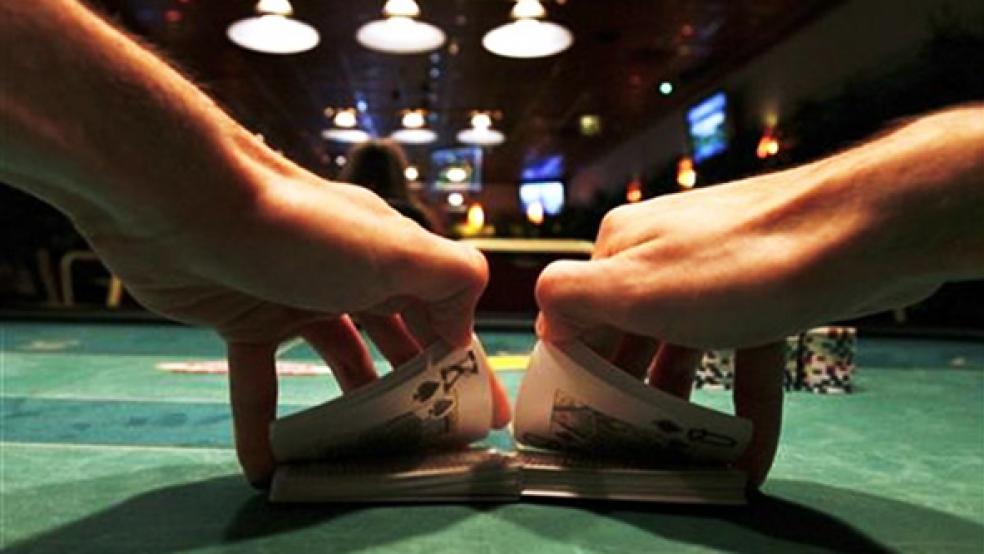Shortly before sunrise on Tuesday, Morgan Capezzera reclined on the roulette table at the Revel Casino in her bikini and snapped a selfie before the Atlantic City gambling hall shut its doors for good. "I love Revel," said Capezzera, 30, of Toms River, New Jersey, who spent most of the day at the casino. "I lost, but I don't care."
She was one of few fans who came out for the closing night of a two-year-old casino once heralded by Governor Chris Christie as a new model for the down-on-its-luck New Jersey shore gambling hub.
The $2.4 billion project this year went into bankruptcy for the second time in its short history and is one of four Atlantic City casinos to announce that it would shut its doors this year, taking a heavy toll on the budget in a city where the property tax base is expected to fall to $10 billion by 2015, less than half its 2010 level.
Related: Chips Are Down for Atlantic City's Hard-Luck Revel Casino
Revel closed with a whimper during the Labor Day holiday weekend, its final gasps coming from the bar, where staff sold opened bottles of liquor to the last customers for $5. Its 57-story hotel was dark on Monday, and by the evening waiters at some of the independently owned restaurants that had stayed open greeted diners by reciting the list of dishes that were no longer available.
Management had advertised a 5 a.m. closing time intended to give gamblers time to cash out before the doors closed an hour later. But with just a dozen people, the roulette and blackjack tables remained open till almost 6 a.m. Meanwhile, state troopers patrolled the floor to guard against vandalism, which had marred the closing of the Atlantic Club earlier this year. "I thought everyone and their mother would be here," said Sara Pully, 29, of Bergenfield, New Jersey. "It's the last night."
Laureen Dunn, 60, a blackjack and roulette dealer, said many of the casino's employees took advantage of unused vacation time rather than work the final night. She chose to work a shift that ended at 3 a.m. "I wanted to earn income until the last minute," Dunn said. "What can you do with six months' unemployment?"
A Great Deal?
Revel, which employed 3,100 at its peak, was the third Atlantic City casino to close this year. Its nearest neighbor, the Showboat, closed on Sunday. A fourth casino, the Trump Plaza, is scheduled to close Sept. 16.
Related: Gambling Addiction Among Seniors Is on the Rise
Just hours after the casino closed, parent company Revel AC Inc canceled a U.S. Bankruptcy Court hearing scheduled for Tuesday.
The company said in a filing with the U.S. Bankruptcy Court in Camden, New Jersey, that it canceled the hearing after reaching agreements with landlords, a slot machine company and financial creditors, among others. Creditors had objected to Revel's proposal for obtaining financing needed until it finds a buyer for the casino complex.
One corporate turnaround specialist said management will likely be willing to wait a few months to get the best price for the property, which will still be well short of the $2.4 billion it cost to build.
David Berliner of BDO Consulting in New York said Revel has advantages, including an oceanfront location and recent closures of other hotels in the city, removing some competition. "Someone's going to get a great deal," he said.
Related: Sex, Cheating and Gambling: Where Americans Draw the Moral Line
The downturn in Atlantic City has been driven, in part, by competition from casinos in nearby states including New York, Pennsylvania and Connecticut. Gaming revenue for Atlantic City, which once held a lucrative East Coast gambling monopoly, has dropped to $2.8 billion from its 2006 peak of $5.2 billion, according to state gaming regulators.
The Revel project ran into trouble soon after construction began. Initial backer Morgan Stanley walked away in 2010 mid-construction, taking a $1.2 billion loss, and the casino opened two years behind its original schedule.
Early plans to build two hotel towers, each with 1,900 rooms, were scrapped in favor of one 1,400-room hotel. Public spaces, however, were scaled to a 3,800-room property, and the gaming floors often felt empty. Revel AC has said it lost roughly $2 million per week, even at the peak of the busy summer season. Revel's designers hoped to lure a younger crowd with Las Vegas-style elan by offering hip nightclubs, rooftop gardens, swimming pools and high-end restaurants.
The strategy emphasized entertainment over gaming, and it remained on display to the end. Thousands of revelers spent Monday partying at the hotel's Revel HQ Beach Club as DJ's played thumping dance music that could be heard for blocks.
But as the party ended, most revelers headed back to their cars, on a path that did not even take them to the same floor as Revel's casino.
With additional reporty by Tom Hals of Reuters.




